“I faced many challenges, but I never let them deter me. No matter how tough things got, I knew I could make it work. I just had to keep going,” says Pratibha Jha, 40, whose journey holds true the statement that with focused effort, anything is within reach.
Growing up in Muzaffarpur, Bihar, a 10-year-old Pratibha would often watch local farmers . “I was always curious about how mushrooms grew,” she tells The Better India. “Something about it fascinated me, but I never thought it could be my livelihood one day.”
Her life took a sudden turn when her father passed away, and at the young age of 15, she was married off to an engineer from Bihar’s Darbhanga. After moving to her husband’s place in Mirzapur Hansi village, her interest in mushroom farming lingered, but the practicalities of starting a business seemed out of reach.
Advertisement
“When I spoke to people in my village about , they didn’t understand it at all,” she admits. Even her in-laws, who were “conservative and sceptical of women working outside the home”, could not see value in what she wanted to do.
But Pratibha was determined to follow her passion for mushroom cultivation. “I told my husband that I wanted to start mushroom farming. He admitted he didn’t know much about it either, but I expressed my desire to carve out my own identity beyond the traditional role of a housewife, and he wholeheartedly supported me,” she says.
With little knowledge and even fewer resources, Pratibha decided to shape her identity in this field. In 2015, she went to the Darbhanga Agriculture Department to inquire about training, but they directed her to Bihar Agricultural University (BAU), Sabor University, in Bhagalpur.
Advertisement
“I remember I saw an ad for , but when I contacted them, they said that the course was over and I should try next year. So I waited,” she laughs, reflecting on the delays. Finally, in early 2016, she began her formal training, which opened her eyes to the potential of mushroom farming.
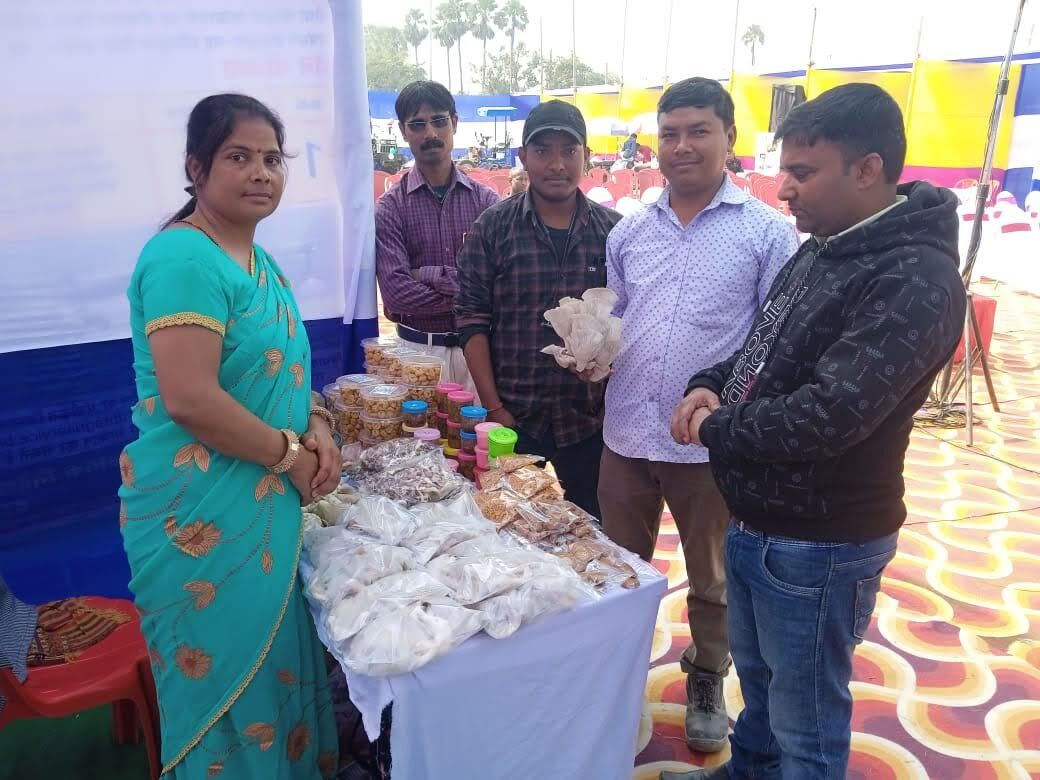
The entrepreneur sells her mushrooms at fairs and events in Darbhanga.
“With Rs 500 in hand, I started my first batch of oyster mushrooms,” she recalls. She used a vacant 10×10 room in her old house as her first mushroom farm. “I didn’t even have a proper setup. I bought some mushroom spawn, polythene bags, formalin, and raw materials to begin,” she says.
Her first harvest was modest, consisting of 20 packets of , which brought in a humble earning of Rs 1,000. “It wasn’t much, but it gave me the confidence that I could make this work and I used my first earning to broaden my cultivation,” she explains.
Advertisement
However, she realised that one of the biggest obstacles in growing her mushroom farm was obtaining the spawn. Pratibha’s initial source in Muzaffarpur wasn’t consistent, so she had to look for alternatives to sustain her business. “That’s when I learnt about Pusa University in Delhi,” she says. “I went there for a 15-day training, and learnt how to make my own spawn, which completely changed the game.”
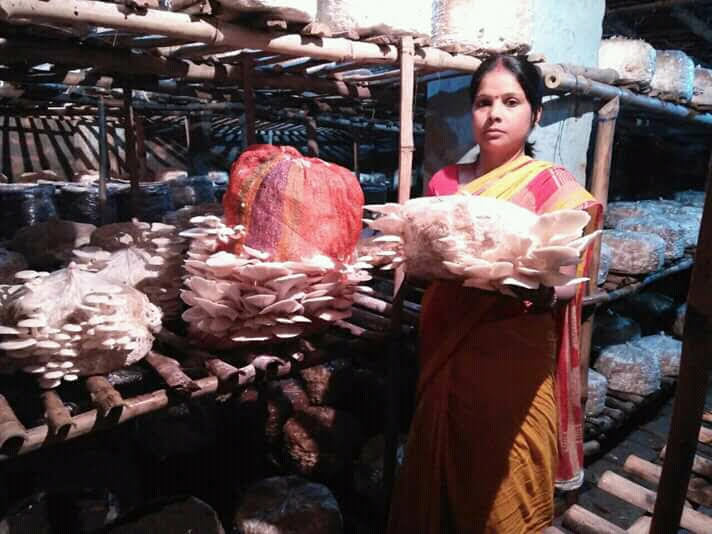
Pratibha grows oyster mushrooms, milky mushrooms, and button mushrooms.
“I started making . I purchased a small autoclave and used a spirit lamp as a substitute for laminar to keep costs low. With this simple setup, I was able to produce 10 kg of spawn every day,” she explains.
With new skills and more experience, she expanded her mushroom operations. By March 2016, she started cultivating milky mushrooms on her farm. But like most entrepreneurs, her journey was not without setbacks.
Advertisement
“The first time I tried to cultivate milky mushrooms, I planted 50 bags. I only harvested 30 kg when I should have gotten 50. But I didn’t give up. I learnt from my mistakes and kept going,” she says.
Soon, Pratibha began to see substantial progress; her efforts began to yield bountiful harvests. As her mushrooms grew, and her farming methods improved, the next challenge she had to tackle was marketing.
“In the beginning, people in my area didn’t even know what mushrooms were. They couldn’t believe they could eat them. It was tough to convince them to buy my produce,” she recalls. To make sure that her produce didn’t go to waste, she started drying the mushrooms and sending them to Pusa University. Slowly, her dried mushrooms found a market, and she built a stable earning through that.
Advertisement
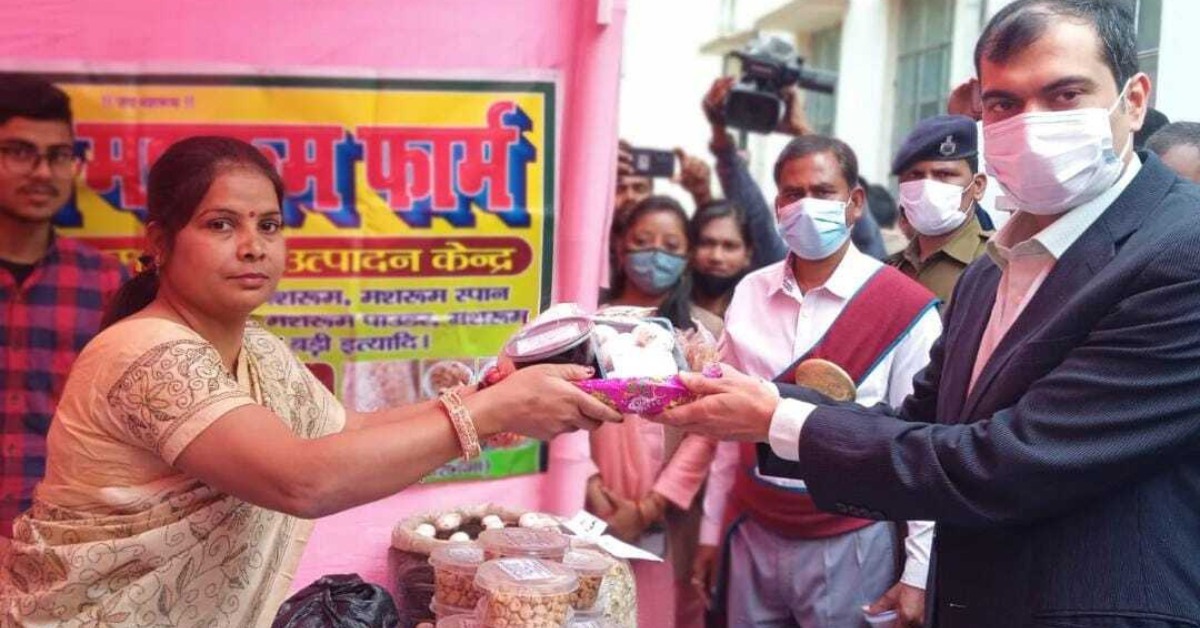
“My goal was to build trust and create loyal customers,” Pratibha says.
In October 2016, she also ventured into , a process that begins with preparing the compost. “By November, the first harvests of this variety are ready to be reaped,” she explains.
It wasn’t until 2017, however, when people from nearby towns started showing interest in her mushrooms, that things truly took off. “I used to sell my mushrooms for Rs 20 per kg, even though everyone else was selling them for Rs 40 in the local markets. At that time, I wasn’t focused on profit. My goal was to build trust and create loyal customers,” she explains.
And that’s exactly what she did. Over time, her fresh mushrooms gained a reputation for being free from chemicals and preservatives, unlike her competitors in the local markets. “People started calling me and placing orders for 4-5 kg of oyster mushrooms and milky mushrooms at a time,” she says smiling. “Once they tasted the mushrooms, they kept coming back because they understood the difference in the quality.”
As her business flourished in the next couple of years, the entrepreneur realised the importance of sharing her knowledge with others. In 2018, Pratibha began offering mushroom farming training to aspiring individuals in her village. With the support of the Darbhanga Agriculture Department, she was able to establish and formalise these classes
“It felt good to teach them the process and see them start their own businesses. Participants in the training programme also purchased spawns from me at Rs 100 per kg,” she shares.
“Initially, I earned Rs 500 a day from the training sessions, and organised around 20 classes each month,” she recalls. “After gaining more experience, my pay increased to Rs 1,200 per session, and now, I conduct them daily.”
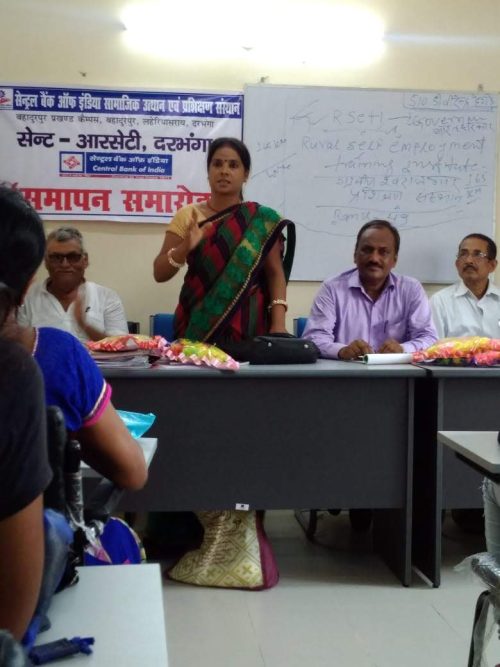
Pratibha has trained over 10,000 farmers and helped them set up their mushroom business.
So far, Pratibha has trained over 10,000 farmers, far beyond her village. “The most rewarding aspect is witnessing these farmers now selling their mushrooms in local markets. Villagers who once knew little about mushroom cultivation are now reaping significant profits,” she shares with pride.
“I first met Pratibha ma’am in 2020 during a mushroom training class, and her story truly inspired me. I wanted to start my own business, so I began classes in January and purchased spawns from her to begin mushroom cultivation. I invested around Rs 3,000 to grow oyster and milky mushrooms,” Kumari Abhilasha (35), from Darbhanga, recalls. “Although I learnt about button mushroom farming, I have plans to begin that later. My income has now increased to about Rs 10,000, and I got a great yield right from the start.”
Today, Pratibha’s business generates a steady income through multiple streams. She earns around Rs 40,000-50,000 monthly from training sessions. Her mushroom spawn sales contribute approximately Rs 1 lakh. Additionally, she sells 15-20 kg of fresh mushrooms daily at Rs 150 per kg, generating Rs 15,000-20,000 each month.
She also helps fellow farmers by buying their mushrooms at a slightly lower price and reselling them, creating a mutually beneficial arrangement. All of these efforts bring her a monthly turnover of around Rs 2 lakh.
In addition to her core business, Pratibha has introduced value-added products like mushroom pickles, papads, and snacks, which have been warmly received by customers. She also encourages fellow farmers in her village to set up mushroom pakora stalls in the evenings, providing them with an opportunity to boost their sales and diversify their income.
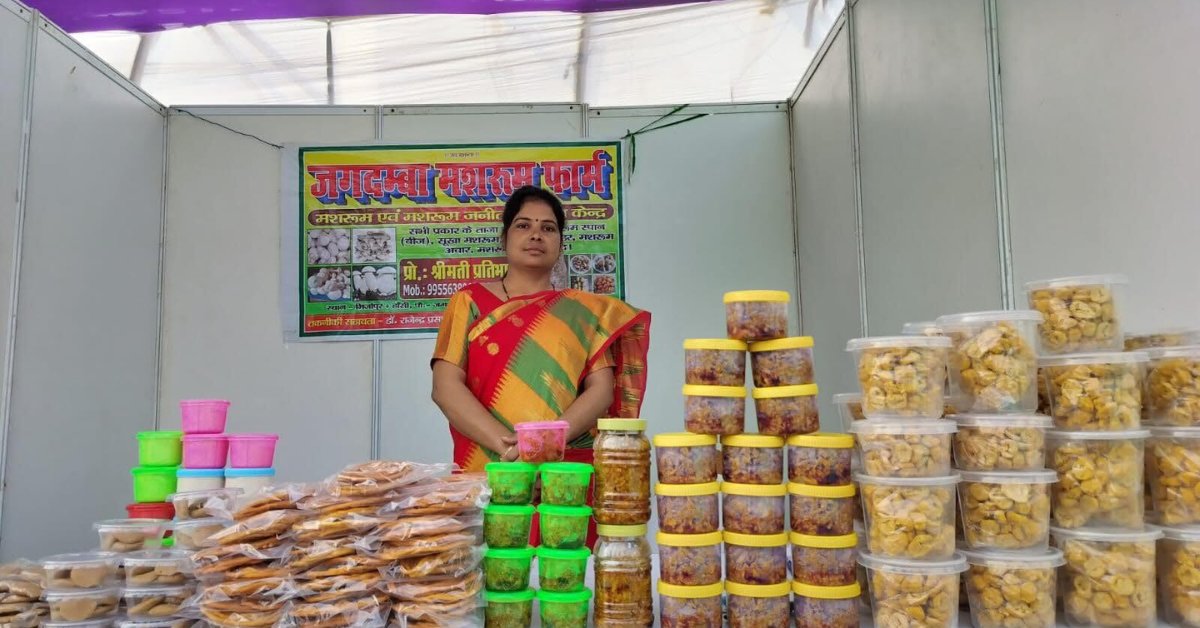
Pratibha introduced value-added products like mushroom pickles, papads, and snacks.
The determined entrepreneur dreams of expanding her business beyond Darbhanga in the near future. “I want to sell mushrooms in other districts of Bihar,” she says.
“I want to train more people and help them ,” she adds. “I believe anyone with a vacant room can start mushroom farming and earn Rs 15,000-20,000 in the beginning. It’s the easiest business to start.”
Pratibha advises fellow mushroom farmers, “Don’t be afraid to take that first step. Success isn’t defined by how much money or resources you have, but by the determination and drive to make it happen. If I can do it, so can you.”
Edited by Arunava Banerjee; All pictures courtesy Pratibha Jha
Growing up in Muzaffarpur, Bihar, a 10-year-old Pratibha would often watch local farmers . “I was always curious about how mushrooms grew,” she tells The Better India. “Something about it fascinated me, but I never thought it could be my livelihood one day.”
Her life took a sudden turn when her father passed away, and at the young age of 15, she was married off to an engineer from Bihar’s Darbhanga. After moving to her husband’s place in Mirzapur Hansi village, her interest in mushroom farming lingered, but the practicalities of starting a business seemed out of reach.
Advertisement
“When I spoke to people in my village about , they didn’t understand it at all,” she admits. Even her in-laws, who were “conservative and sceptical of women working outside the home”, could not see value in what she wanted to do.
But Pratibha was determined to follow her passion for mushroom cultivation. “I told my husband that I wanted to start mushroom farming. He admitted he didn’t know much about it either, but I expressed my desire to carve out my own identity beyond the traditional role of a housewife, and he wholeheartedly supported me,” she says.
Humble beginnings
With little knowledge and even fewer resources, Pratibha decided to shape her identity in this field. In 2015, she went to the Darbhanga Agriculture Department to inquire about training, but they directed her to Bihar Agricultural University (BAU), Sabor University, in Bhagalpur.
Advertisement
“I remember I saw an ad for , but when I contacted them, they said that the course was over and I should try next year. So I waited,” she laughs, reflecting on the delays. Finally, in early 2016, she began her formal training, which opened her eyes to the potential of mushroom farming.

The entrepreneur sells her mushrooms at fairs and events in Darbhanga.
“With Rs 500 in hand, I started my first batch of oyster mushrooms,” she recalls. She used a vacant 10×10 room in her old house as her first mushroom farm. “I didn’t even have a proper setup. I bought some mushroom spawn, polythene bags, formalin, and raw materials to begin,” she says.
Her first harvest was modest, consisting of 20 packets of , which brought in a humble earning of Rs 1,000. “It wasn’t much, but it gave me the confidence that I could make this work and I used my first earning to broaden my cultivation,” she explains.
Advertisement
However, she realised that one of the biggest obstacles in growing her mushroom farm was obtaining the spawn. Pratibha’s initial source in Muzaffarpur wasn’t consistent, so she had to look for alternatives to sustain her business. “That’s when I learnt about Pusa University in Delhi,” she says. “I went there for a 15-day training, and learnt how to make my own spawn, which completely changed the game.”

Pratibha grows oyster mushrooms, milky mushrooms, and button mushrooms.
“I started making . I purchased a small autoclave and used a spirit lamp as a substitute for laminar to keep costs low. With this simple setup, I was able to produce 10 kg of spawn every day,” she explains.
With new skills and more experience, she expanded her mushroom operations. By March 2016, she started cultivating milky mushrooms on her farm. But like most entrepreneurs, her journey was not without setbacks.
Advertisement
“The first time I tried to cultivate milky mushrooms, I planted 50 bags. I only harvested 30 kg when I should have gotten 50. But I didn’t give up. I learnt from my mistakes and kept going,” she says.
From homemaker to entrepreneur
Soon, Pratibha began to see substantial progress; her efforts began to yield bountiful harvests. As her mushrooms grew, and her farming methods improved, the next challenge she had to tackle was marketing.
“In the beginning, people in my area didn’t even know what mushrooms were. They couldn’t believe they could eat them. It was tough to convince them to buy my produce,” she recalls. To make sure that her produce didn’t go to waste, she started drying the mushrooms and sending them to Pusa University. Slowly, her dried mushrooms found a market, and she built a stable earning through that.
Advertisement

“My goal was to build trust and create loyal customers,” Pratibha says.
In October 2016, she also ventured into , a process that begins with preparing the compost. “By November, the first harvests of this variety are ready to be reaped,” she explains.
It wasn’t until 2017, however, when people from nearby towns started showing interest in her mushrooms, that things truly took off. “I used to sell my mushrooms for Rs 20 per kg, even though everyone else was selling them for Rs 40 in the local markets. At that time, I wasn’t focused on profit. My goal was to build trust and create loyal customers,” she explains.
And that’s exactly what she did. Over time, her fresh mushrooms gained a reputation for being free from chemicals and preservatives, unlike her competitors in the local markets. “People started calling me and placing orders for 4-5 kg of oyster mushrooms and milky mushrooms at a time,” she says smiling. “Once they tasted the mushrooms, they kept coming back because they understood the difference in the quality.”
Mentoring fellow farmers
As her business flourished in the next couple of years, the entrepreneur realised the importance of sharing her knowledge with others. In 2018, Pratibha began offering mushroom farming training to aspiring individuals in her village. With the support of the Darbhanga Agriculture Department, she was able to establish and formalise these classes
“It felt good to teach them the process and see them start their own businesses. Participants in the training programme also purchased spawns from me at Rs 100 per kg,” she shares.
“Initially, I earned Rs 500 a day from the training sessions, and organised around 20 classes each month,” she recalls. “After gaining more experience, my pay increased to Rs 1,200 per session, and now, I conduct them daily.”

Pratibha has trained over 10,000 farmers and helped them set up their mushroom business.
So far, Pratibha has trained over 10,000 farmers, far beyond her village. “The most rewarding aspect is witnessing these farmers now selling their mushrooms in local markets. Villagers who once knew little about mushroom cultivation are now reaping significant profits,” she shares with pride.
“I first met Pratibha ma’am in 2020 during a mushroom training class, and her story truly inspired me. I wanted to start my own business, so I began classes in January and purchased spawns from her to begin mushroom cultivation. I invested around Rs 3,000 to grow oyster and milky mushrooms,” Kumari Abhilasha (35), from Darbhanga, recalls. “Although I learnt about button mushroom farming, I have plans to begin that later. My income has now increased to about Rs 10,000, and I got a great yield right from the start.”
‘Don’t be afraid to take that first step’
Today, Pratibha’s business generates a steady income through multiple streams. She earns around Rs 40,000-50,000 monthly from training sessions. Her mushroom spawn sales contribute approximately Rs 1 lakh. Additionally, she sells 15-20 kg of fresh mushrooms daily at Rs 150 per kg, generating Rs 15,000-20,000 each month.
She also helps fellow farmers by buying their mushrooms at a slightly lower price and reselling them, creating a mutually beneficial arrangement. All of these efforts bring her a monthly turnover of around Rs 2 lakh.
In addition to her core business, Pratibha has introduced value-added products like mushroom pickles, papads, and snacks, which have been warmly received by customers. She also encourages fellow farmers in her village to set up mushroom pakora stalls in the evenings, providing them with an opportunity to boost their sales and diversify their income.

Pratibha introduced value-added products like mushroom pickles, papads, and snacks.
The determined entrepreneur dreams of expanding her business beyond Darbhanga in the near future. “I want to sell mushrooms in other districts of Bihar,” she says.
“I want to train more people and help them ,” she adds. “I believe anyone with a vacant room can start mushroom farming and earn Rs 15,000-20,000 in the beginning. It’s the easiest business to start.”
Pratibha advises fellow mushroom farmers, “Don’t be afraid to take that first step. Success isn’t defined by how much money or resources you have, but by the determination and drive to make it happen. If I can do it, so can you.”
Edited by Arunava Banerjee; All pictures courtesy Pratibha Jha
